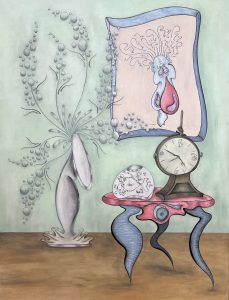Eschew Perfectionism & Seek Brilliance
For many years, I mourned my unrealized life as a world-renowned painter. Until the age of twelve, I drew and painted almost every day. I filled my imagination with fantasies of posh galleries, television interviews and billion dollar sales. As I recall, I told myself that my career “failed” for many reasons. My parents would not send me for lessons–not even helping me mail and submit that art contest thing in TV Guide (Remember that one?). Or when my artist-grandfather molested one of my favorite works, painting over it to show me how to “fix” it. Or when I could not fit an art class into my honors-heavy college path high school schedule.
How we lie to ourselves.
Creatives, like you and I, are particularly hard on ourselves. How many of us drop our creative pursuits because of external — or internal — criticism?
THE ZONE — GETTING REAL
The truth is, around the age of twelve, as I lounged at the library, perusing picture books of fine art, mesmerized by the works of Georgia O’Keefe, Vermeer, Monet, I realized, deeply and totally, and frankly, that I was not very good at painting. Just to clarify, I was not comparing my neophyte skill to that of the masters. I knew I was still learning. I was, however, comparing the passion and innate talent so evident in the masterworks, so missing in my own attempts at “art.”
I did not have “it” and I knew it, deep down. But instead of admission, I chose the route of immaturity and lack of self-awareness we all choose: Blame. I didn’t get lessons. I had no support system. No one helped me. My parents were very supportive and encouraging. I stopped painting and drawing because it was a waste of time to pursue something at which, at best, I would reach mediocrity. And as a failed fine artist, I would abandon areas of strength where I could achieve greatness. It was just easier to maintain my “could have been” story than to admit defeat.
So I do not play the flute. Or call myself “chef.” Or sing. Or act. Or engineer bridges. Or add “CPA” or “Certified Financial Planner” after my name. The moment we realize our weaknesses, we can use our energy to nurture our strengths. The sign of high self-esteem is being able to laugh at and appreciate our weaknesses–to shake them off, appreciate our strengths and know we are meant for other things.
When I’m using my strengths, I find time has no meaning: I enter “The Zone.” Hours pass as I experience only minutes. Bombs could explode around me and my focus is unshaken. Joy flows through me. When I write, create a business strategy, negotiate, or execute a photo shoot, I am in that zone.
Emotional and intellectual maturity begin with our recognition that we are good at some things and not at others. Often a creative person is good at any artistic persuit. I can paint and draw. Just not well. I’m not in the zone when I do it- I’m stressed. I can act and have been in several plays. But I am miserable the entire time.
For these pursuits, I am not in the zone. I am in hell.
NOT GOOD ENOUGH
The first time I dropped out of college (yes, I dropped out several times), I did so in protest against my creative writing professor, who red-penned the first chapters of my novel into a paper bloodbath. I had enough of college and criticism. At least that was my story. Here was the moment I wasted and delayed success for too many years. Just because we have a strength does not mean we do not need training–that we cannot improve.
Here’s the truth of it: Not everyone deserves a trophy or a ribbon.
Sometimes, one is just not good enough–or someone else is obviously better. If it really means something to us — if we know we are expressing a strength–then we should know we need coaching. The award or the ribbon or the medal will not make us great and is just a lie to foster a false sense of self-esteem. Failure, dedication, focus, drive, getting up after we lose–that is the soil in which we nurture greatness.
This is a forgotten precept in society and we punish ourselves and harm our children in our delusion. Everyone gets a trophy. We deem everyone “great.” It’s just not true, and it’s divisive. Try to tell a student they should “skip” college or drop the dream of playing in the NFL. Try to tell anyone they have a weakness. Dangerous ground.
We must differentiate between a route which will end in a trophy and self-deception. While I am not going to win an Oscar any time soon, I could make it to the New York Time’s best-seller list. I know it. But it’s going to take blood, sweat, and tears. And some realistic balance.
WRONG ROUTE
Last semester, one of my students struggled with a basic undergraduate research assignment. As a senior, she should have been well-prepared to excel. Privately, she admitted she wanted to be a cosmetologist, and she showed me some of the work she had done with friends and at her part-time job. Beautiful. She had an eye for fashion and color and was very talented. She glowed when telling me how she was developing new eye makeup. Then, her face fell, tears formed as she disclosed her parents refused to pay for her cosmetology license if she did not earn her degree. She barely passed her classes over four years and felt like she was delaying her life.
What are we doing to our world?
I am not saying to kill dreams or passions. This is not akin to Michael Jordan’s famed failure when he was cut from his high school basketball team–where Michael’s height was the determining factor. This is not akin to being the subject of opinion–when the Beatles were denied a record contract.
What I am talking about is being realistic about our own skills and strengths–and having realistic goals and dreams.
DIG IN
A few months ago, I completed my novel and sent it to my editor, who tore it to shreds. Instead of giving up and crying and blaming or demanding my trophy, I took his critique to heart and started re-writing. Writing is my passion — and a strength. But excellence often evades me. The criticism was painful, but I learned so much about myself and what I still needed to master. And now? That novel is not just good or okay–it’s freaking brilliant. And I know it. And my editor now agrees.
Be honest. What are your strengths? What are your weaknesses? Do you need training to pursue a passion? Should you leave some things to become happy hobbies? Where should you put your energy? How can you make this world a better place?
I still paint as a hobby–and I am still not very good at it, but I enjoy the challenge and the relaxation it provides. Recently, a friend explained why she abandoned her dance career and became a social worker: “I just sucked. It was that simple. And I knew it. And blamed everyone else. It was when I came to terms with how badly I sucked, how I could not turn out my feet, that I could become fully who I was to become. But I still dance every day, because I love it.”
Just like my friend, I am not painting for anyone else but myself.
YOU — IMPERFECT
This month we are going to screw up really badly. We are going to make mistakes and errors and faux pas. We are going to get our facts wrong. Hold uninformed opinions. Spell words wrong. Dangle prepositions.
And we will still be marvelous miracles deserving of love and compassion.
Perfectionism. The fear of making a mistake. The belief that one can live without “sin.” Straining towards flawlessness. Being self-critical to the point of freezing. One can be a work-perfectionist. Some, a relationship-perfectionist. Throwing a “perfect” party; making a “perfect” souffle. Wearing the “perfect” clothing. It’s exhausting.
When we break it down, perfectionism results from an immersion in the need to feel significant–or, if you prefer, the result of an unbalanced (overactive) solar chakra. Same thing. Really look at it: When we seek to be perfect, what are we really doing? We are trying to avoid criticism. We are trying to be “the best”–better than everyone else. We reach for unattainable ideals and continually correct and re-correct ourselves until it’s “perfect.”
The act of attempting perfection is an act of self-hate. You think what you do without personal criticism is not good enough. You fear criticism. People will not like you. Psychologists know perfectionism results from over-criticism as a child–or a lack of boundaries, a sense of self-worth and the need for approval from others. This is a deep fear: that we will not be loved (because we are not enough, we are not “right,” we are “bad.”) The result: Depression. Body dissatisfaction. Loneliness and social isolation. Anxiety. Anger at or blaming of others.
Let’s get to the bottom of perfectionism. First, perfectionism is unnecessary. Assuming Shakespeare really wrote all with which he is credited, not all his plays are great. Really. Read them. His “masterpieces” are few; others, like Troilus and Cressida, are mildly entertaining. So, even the “best” writer ever had failures. The key here is where one critic will say a play is average or poor, another will deem it a “masterpiece.” Perfectionism is subjective and a perception in the beholder’s eye.
Second, failure does not mean you are not working in one of your areas of strength. Just because you lost the competition, they rejected your story, they did not choose you for the new position or promotion, does not mean you are not the zone. Not every effort is a winning one.
Third, the scary part is that true perfection is unattainable. It’s a myth. Black and white thinking. Matter and energy are in flux and constantly changing. Everything and anything can always be improved. The idea there is a point of “perfect” is madness.
Last, and most importantly, doing one’s best is not the same as trying to be perfect. Practicing excellence and striving to perform at your peak is not perfectionism. For example, I pen these articles and usually review two to three drafts before I am satisfied. I might find better words. Correct spelling and grammatical errors. Use a better metaphor to make a point. Then, I ask myself: Is this the best I can do? Am I communicating what I want to say? Will the reader benefit from these words? In short, did I do the best I could to accomplish the goal in the time allotted? That’s personal integrity.
If I was striving for perfection, my message would never get out there and I would help no one.
Here’s some guidelines:
- Forget “perfect”–practice doing your best. Practice being honorable and having personal integrity. You dress well when you go out for the evening, but you do not cancel plans because you do not have the “perfect” shoes. You thoroughly and ethically research your paper and write it with focus and attention, then you turn it in because you got the job done well.
- Recognize you can control some aspects of a project or steps towards any goal, but you cannot control it all.
- When you feel perfectionism rearing its ugly head, try to locate the true feelings behind it. Why does your self-esteem get triggered? About what are you really afraid? Sit with it. Is this project or activity something you enjoy? Are you great at it? Do you need training? Education? Help? Are you merely beating up yourself?
- Then tell perfectionism to shut up. “Thank you emotions and lizard brain for telling me I am feeling vulnerable and frightened. I see why and I am going to move on!”
- Ask yourself: Is continuing to alter this project (or action) to improve it worth my time? Is it necessary? This is a check on your personal integrity.
On what we should focus is our personal integrity. The genuine test of character is getting up and trying again. Correcting your mistake. Making an apology. Making amends. Strive to be the best you you can be in all your imperfect glory.



